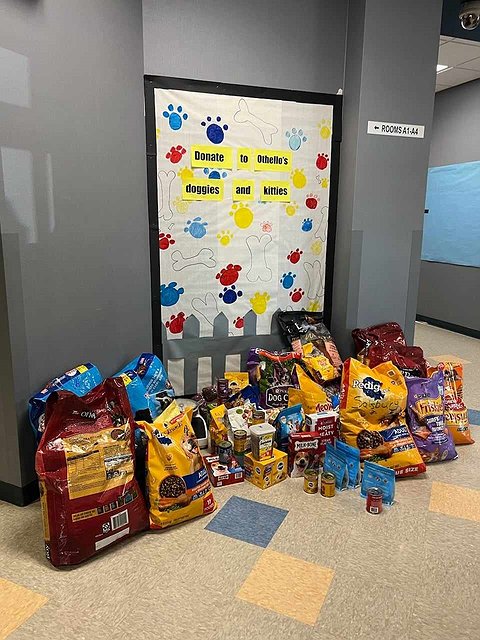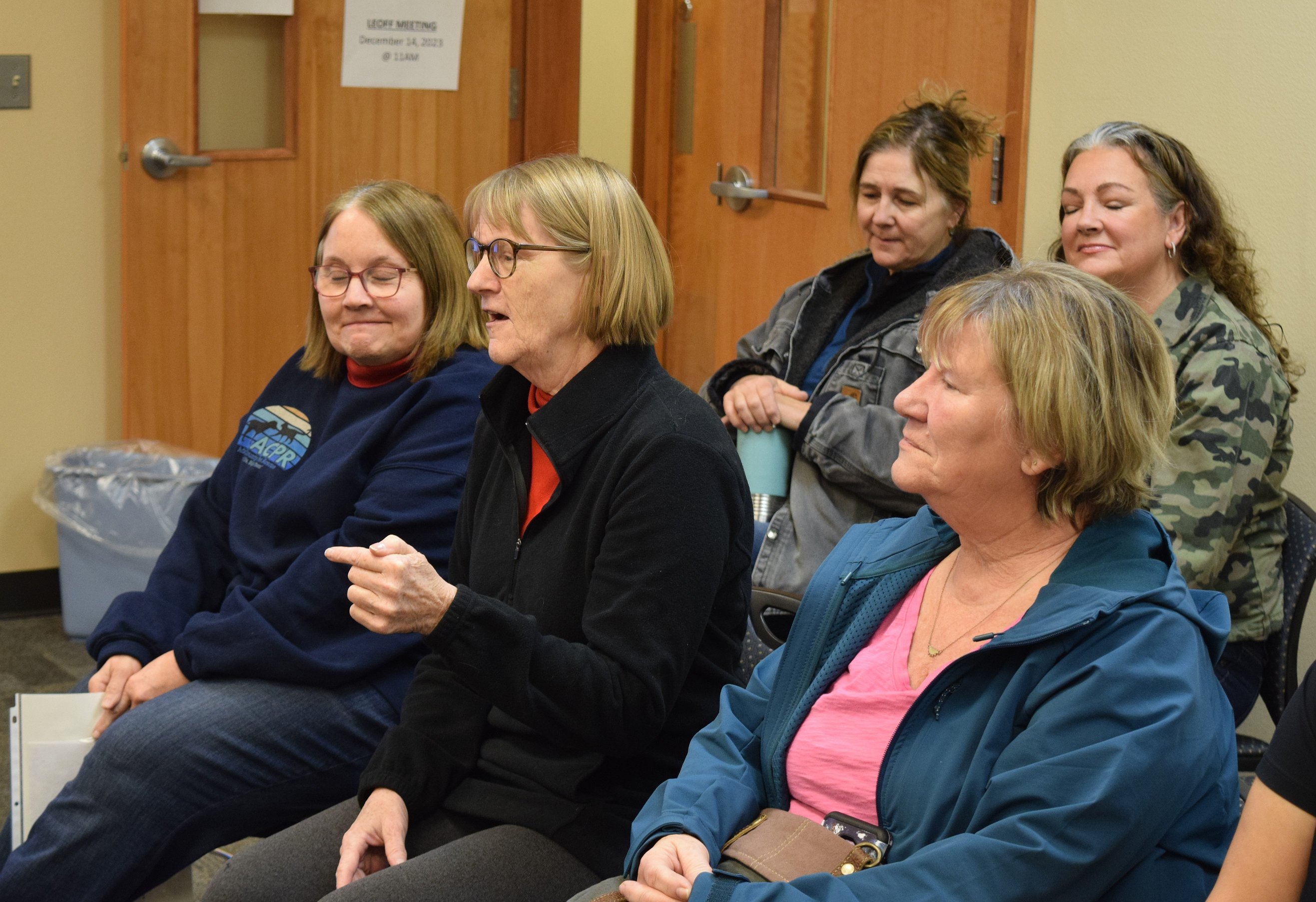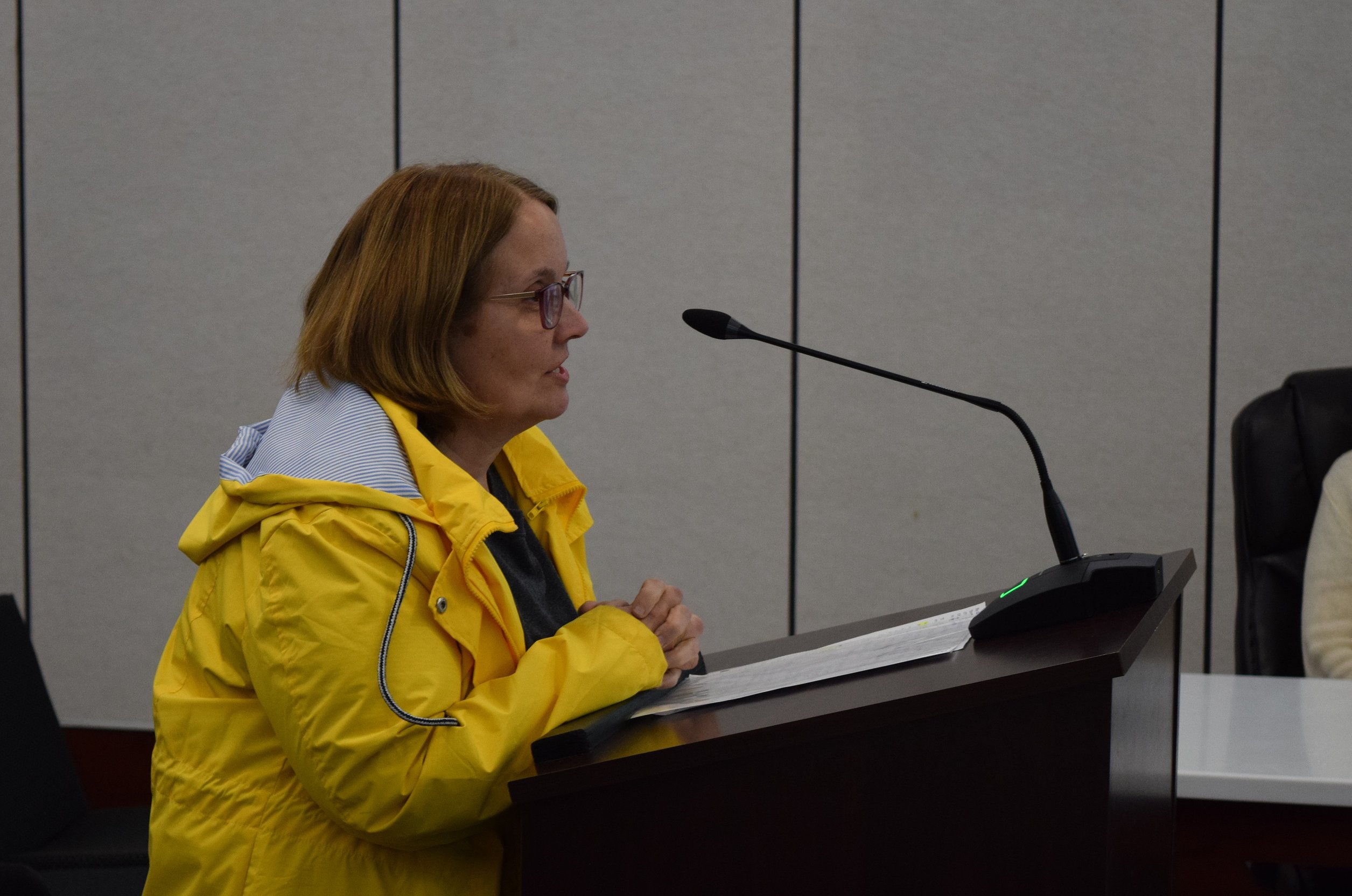ACPR gets involved with Othello schools
GABRIEL DAVIS | Hagadone News Network | UPDATED 1 year, 11 months AGO
Gabriel Davis is a resident of Othello who enjoys the connections with his sources. Davis is a graduate of Northwest Nazarene University where he studied English and creative writing. During his free time, he enjoys reading, TV, movies and games – anything with a good story, though he has a preference for science fiction and crime. He covers the communities on the south end of Grant County and in Adams County. | December 29, 2023 1:30 AM
OTHELLO — Adams County Pet Rescue board member and Othello resident Kim Bailey do what they can to help the ACPR, and one of the ways they do this is by volunteering to go to schools in Othello and teach students about the compassionate care of animals.
“With the younger children, our main focus is the proper care of animals; what they should eat, what they shouldn't eat, what you need to do to keep your pet healthy, take them to the vet, get their vaccinations, play with them, little tips for getting them potty trained,” Foley said. “With the older kids, who will in a few years' time be pet owners themselves, we talk about that but we also talk about the responsibilities that come with being a pet owner, which means spaying and neutering and vaccines, and we know spaying and neutering is a touchy topic. However, it's out of control in Othello. We've taken in 1200 animals this year. That's insane.”
Foley spoke about the children’s response to their classes at the schools. Both Foley and Bailey are retired teachers who worked at Scootney Springs Elementary in Othello.
“The kids always want to tell us about their animals. They want to tell us about any time they were sick or hurt,” Foley said. “They want to tell us if they did something kind for an animal, if they rescued one or helped one, and they want to tell us that their dog had puppies.”
Foley said there is more to the classroom visits than just spreading awareness.
“We are very sensitive to the fact … that an 8-year-old has no control over whether their parents vaccinate their dogs or get them spayed or neutered. So we don't want them to feel bad that their dog had puppies,” Foley said. “We want them to be happy because puppies are cute, but we want them to understand that then we need to find homes for those puppies and if their parents wanted them to have puppies, that a good alternative is that they could foster a puppy through Pet Rescue. So we talk a lot about our fostering program. They could foster a pregnant momma dog, they could foster puppies, they could foster an older dog, they could foster kitties. So if their parents say, ‘We can't have a pet because it's too expensive then we tell them you could foster one for Pet Rescue and we’ll give you bedding, food, a kennel, everything.”
Foley said Kim and her would like to start going to junior highs and high schools.
“We know that those kids are soon to be pet owners,” Foley said. “We sent out invitations to all the schools, but Scootney Springs has fully embraced us, and we've done all the classrooms at Scootney, grades two through six, and then we've just started going to Hiawatha (Elementary School).”
Scootney Springs Counselor Jill Powell and three of the school’s sixth-grade leadership students — Manuel Gallegos, Abigail Prows and Kinsley Roylance — talked about some of the partnerships Scootney Springs has implemented with Foley and Bailey. Powell said the three students all had Foley and Bailey as teachers when they taught at Scootney Springs.
Gallegos talked about Foley and Bailey’s involvement with the school.
“They bring the dog Honeybunches,” he said, “and they were telling us how about all the things that we could do to help out, and that they've been really short on food, and that they didn’t have enough money for the dogs.”
The three students all said they wanted to help support ACPR, and that they enjoyed Foley and Bailey’s visits to the school.
“Well, what we did was we each went around with a chart,” Roylance said, “and we went to each classroom and asked if they had any dog food that they would raise, and whoever raised the most cat and dog food, they got a popcorn party.”
Powell said the food drive and other events were part of Kindness Week in October, and part of the students’ leadership class.
“We just help our school with things that we need done,” Roylance said. “It was during Kindness Week and so that was our activity for kindness, being kind to the dogs.”
Roylance explained why she liked helping ACPR.
“It was nice being able to help all the cats and dogs because … I know there are cats and dogs that are dying and people aren't treating them well,” she said.
Gallegos also commented on helping out.
“And they also had about no food, (ACPR was) saying, and then they didn't have enough money to get more food, and when we did the fundraiser they got a lot of more food,” Gallegos said.
Powell said the fundraiser likely raised close to 600 pounds of food. She elaborated on some of the benefits of having Foley and Bailey involved with the school.
“Just seeing them and having their presence in our building, even though they've retired, has been a huge benefit to the kids. Their efforts and just the knowledge and background that they come with to come in and teach our kids a little bit more about how to be kind to animals, is pretty inspiring,” Powell said. “The kids really love it…Honeybunches, that therapeutical dog (Foley) has go with her places, the kids have quite an attachment to her and love seeing Honeybunches and giving Honeybunches hugs and treats, so it's cool. It's really good that they're so involved still in the school.”
Gabriel Davis may be reached at [email protected].
ARTICLES BY GABRIEL DAVIS

Work-based learning lets students build their own futures
MOSES LAKE — Work-based learning provides education opportunities for the workforce to receive hands-on training and technical education and prepare themselves to enter various industries. Educators and workforce development professionals from Eastern Washington discussed some the training they offer and the benefits of their programs. Next Generation Zone, an affiliate of WorkSource based in Spokane, provides job training opportunities for youth and young adults ages 16 to 24. Program Coordinator Kate Martin said there are multiple benefits to the program. “One of them is a paid work experience, and that’s where we reach out to area employers who are willing to take a young person and train them,” she said. “This is a short-term learning experience, so it’s typically about 240 hours; sometimes it could be longer or shorter. We’re the actual employer; we cover all of their wages, taxes, the L&I, and the employer just agrees to give them the experience and train them in whatever field it is that they’re wanting to go into.”

Serving schools: ESD superintendents reflect on operations, priorities
MOSES LAKE — Educational service districts are government-mandated agencies put in place to provide services to school districts across the state. ESD Superintendents discussed what they do and their priorities in operating their districts. ESD 105, led by Superintendent Kevin Chase, serves four counties, including Kittitas, Yakima and portions of Klickitat and Grant counties and provides support for 25 school districts – including Royal School District and Wahluke School District – and more than 66,000 students. “We help them collaborate with each other as well or collaborate with other partners,” Chase said. “(It’s) a lot of advocacy work, either regionally or across the state, or even federally, working on different issues that impact our education. And we provide very specialized services in certain situations in order to meet the needs of our students in our region and of our school districts.”

Columbia Basin Project making headway through Odessa Groundwater program
CASHMERE — The Columbia Basin Project is making gradual progress toward completion with particularly significant accomplishments for the Odessa Groundwater Replacement Program in the last six months or so, according to Columbia Basin Development League Executive Director Sara Higgins. “When we’re dealing with a project of this size, advancement is kind of like watching paint dry, but yes, there have been (developments),” she said. “There are a lot of exciting things happening right now.” There are more than 300 miles of main canals, about 2,000 miles of lateral canals and 3,500 miles of drains and wasteways in the irrigation project, according to the U.S. Bureau of Reclamation website. The CBDL advocates for the operation of those waterways and for the project to continue “build-out.”







